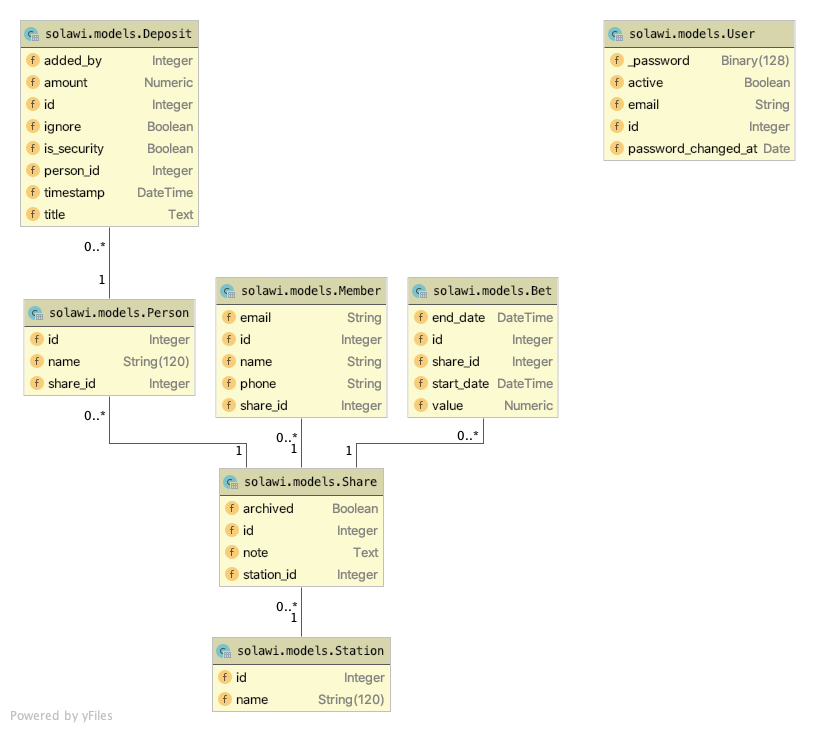Internal tool at our CSA (Community supported agriculture) group that helps manage finances.
The frontend is csa-frontend.
Make sure that you have a virtual environment set up for the project.
Install Poetry
Install all requirements
poetry install
This app requires a set of environment variables to be defined:
| name | description | example value |
|---|---|---|
| DATABASE_URL | The URL for the database that the application should use | postgresql://postgres@0.0.0.0:5432/solawi |
| DATABASE_URL_TEST | The URL for the database that should be used for tests | postgresql://postgres@0.0.0.0:5432/test_solawi |
| FLASK_DEBUG | Set to True for better local debugging. Always False for production |
True |
| FLASK_APP | The path to the application. Always solawi/app.py |
solawi/app.py |
| CSA_ACCOUNT_BLZ | The Bankleitzahl for the account from which deposits should be imported | 43060967 |
| CSA_ACCOUNT_IBAN | The IBAN for the account from which deposits should be imported | DE26500105175461841195 |
| CSA_ACCOUNT_USERNAME | The username for the bank account from which deposits should be imported | example.person |
| CSA_ACCOUNT_PASSWORD | The password for the bank account from which deposits should be imported | hunter2 |
| CSA_HBCI_PRODUCT_ID | The HBCI product id for the application. Fill in this form to register | 123ABC4567DEF89GHIJKLMNOP |
Migrations are managed with Flask-Migrate.
poetry run flask db upgradeOn the first run, you need to initialize your database. Make sure your environment variables are exported and then run:
poetry run flask db upgradeThis only needs to be done initially and whenever the DB schema changes.
In order to start the application you have to run:
poetry run flask runData is imported via the bank's FinTS API. Make sure that you set the correct enviornment variables for your bank and then run.
poetry run flask import-statementsWhen you deploy the application, you should put this into a cronjob and run it daily (or weekly if that is sufficient for your use case).
The import-statements command takes a --interactive/--non-interactive flag. If it is set to --non-interactive
(this is the default), it will raise an exception if the bank requires a TAN for this import to be completed. If this
happens, the command should be re-triggered from the command line with the --interactive flag and the PIN should be
put in by the developer. Due to PSD2 regulations this manual import with a PIN will probably have to be done about
once per quarter (but this is at the bank's discretion).
There used to also exist an endpoint to manually import data where users could upload a CSV that the previously exported from the bank's website. This integration broke when our bank switched backend providers though and was replaced by the FinTS import. The code was removed in commit 5fa2518b37ce54d728c855f379a758442819f669.
 A user is a user of the application who can log into the system.
A user is a user of the application who can log into the system.
A station is a place where members can pick up their vegetables. It is important from an organisational perspective mostly.
At every station there are shares. A share has (multiple) members. Members are used to show who a share belongs to and to generate members lists for each station.
A share has (multiple) bets. A bet is the amount of money that the share promised to pay for a range of time. As there are shares that take part in the CSA over multiple years, a share can have many bets. Their times should never overlap though.
In order to check if the shares all paid their bets properly, deposits are saved to the database. A deposit comes from the bank's exports and records who the payment amount and time. It also can be marked as a security deposit from which every account should have one at the value of this year's bet.
A deposit is always made by a person. A person is the name that shows up in the bank exports. We use it to map entries
in the bank export to shares. In most cases there will probably be a member Jane Doe and also a person Jane Doe
but sometimes people have different names in their bank accounts than they do in real life or they share one (e.g. the
bank export showing Jane & John Doe as a name) so we cannot re-use the member model for this bank specific data.
Users can only be created from the command line. To do so, run:
poetry run flask createuser <email> <password>The application comes with a set of tests which can be run with:
poetry run pytestIn order to also collect coverage reports, run:
poetry run pytest --cov=./In addition to bug fixes, the CSA Share Management tool maintainer/s have the following responsibilities:
- Create new Accounts
- Coordinate imports mit Geli (namely, Geli gets a new PIN on her cell phone every 3 months, after which we have to manually start the import with the new PIN)
- Coordinate end-of-the-year Export for Barny, which is done directly via the Database in Heroku